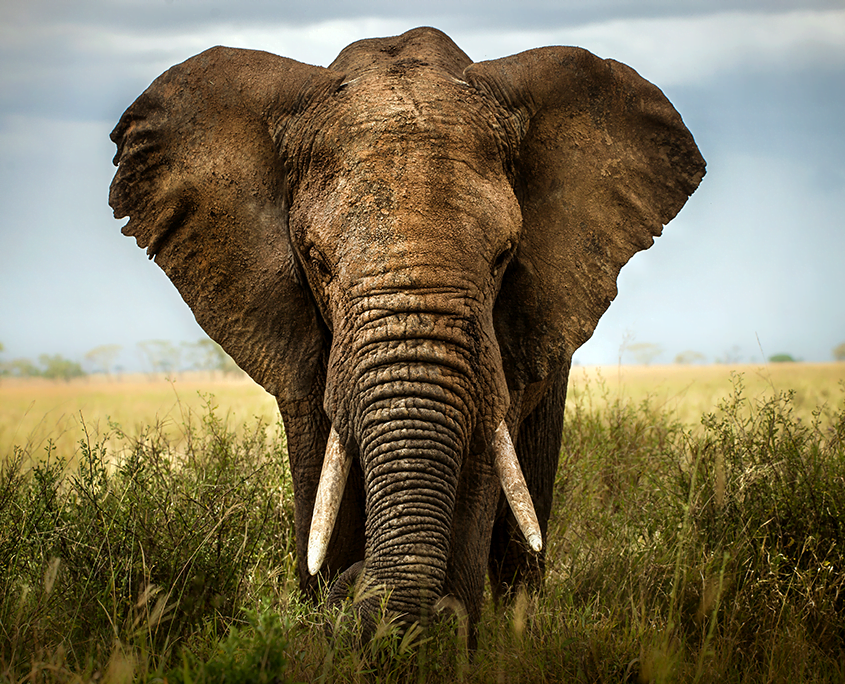The African elephant
Photo Credit: lara_zanarini/iStock/Getty Images
World Environment Day
World Environment Day, 5th June 2019, will be hosted by China, with a theme of #Air Pollution. We can’t stop breathing, but we can do something about the quality of air that we breathe.
World Environment Day 2019 will urge governments, industries, communities, and individuals to come together to explore renewable energy and green technologies and improve air quality in cities and regions across the world.
Air pollution claims 1 out of 9 lives and threatens the future of our climate.
The very air we breathe is growing dangerously polluted: nine out of ten people now breathe polluted air, which kills 7 million people every year.
The health effects of air pollution are serious – one-third of deaths from stroke, lung cancer, and heart disease are due to air pollution. This is having an equivalent effect to that of smoking tobacco and is much higher than, say, the effects of eating too much salt. (WHO, 2019)
Along with harming human health, air pollution can cause a variety of environmental effects such as;
The formation of acid rain when nitrogen oxides and Sulphur oxides are released into the atmosphere when fossil fuels are burned. Acid rain damages trees and causes soils and water bodies to acidify, making the water unsuitable for some fish and other wildlife. It also speeds up the decay of buildings.
Air emissions of nitrogen oxides from power plants, vehicles, and other sources contribute to the amount of nitrogen entering aquatic ecosystems. This greatly accelerates eutrophication which causes stimulation in the blooming of algae which in turn can cause loss of plant and animal diversity.
Animals can experience problems if they are exposed to sufficient concentrations of air toxins over time. Studies show that air toxins are contributing to birth defects, reproductive failure, and disease in animals.
O-zone depletion by man-made chemicals- the thinning of the protective ozone layer can cause increased amounts of UV radiation to reach the Earth, which can lead to more cases of skin cancer, cataracts, and impaired immune systems. UV can also damage sensitive crops, such as soybeans, and reduce crop yields.
Crop and forest damage- Air pollution can damage crops and trees in a variety of ways. Ground-level ozone can lead to reductions in agricultural crop and commercial forest yields, reduced growth and survivability of tree seedlings, and increased plant susceptibility to disease, pests, and other environmental stresses (such as harsh weather).
Global climate change- The Earth’s atmosphere contains a delicate balance of naturally occurring gases that trap some of the sun’s heat near the Earth’s surface. This “greenhouse effect” keeps the Earth’s temperature stable. Unfortunately, evidence is mounting that humans have disturbed this natural balance by producing large amounts of some of these greenhouse gases, including carbon dioxide and methane. As a result, the Earth’s atmosphere appears to be trapping more of the sun’s heat, causing the Earth’s average temperature to rise – a phenomenon known as global warming. Many scientists believe that global warming could have significant impacts on human health, agriculture, water resources, forests, wildlife, and coastal areas.
World Environment Day calls for action from people from different sections of the world to do something for the environment so that their efforts can collectively have a positive impact on the environment.
How then can we participate in World Environment Day’s activities?
Going by Goal 7 of the Sustainable Development Goals, we can continue to aim to ensure access to affordable, reliable, sustainable energy and modern energy- with assistance from our governments and leaders. Renewable energy sources produce less pollution which will help protect the environment and provide us with cleaner air and water.
Collect trash in our communities and dispose of it carefully, and in the right way. Recycle, recycle, recycle!
Research more about environmental issues and come up with ideas to control them. We need the environment; we need a good-working one too! So, let’s start making the necessary changes while we can.
.



